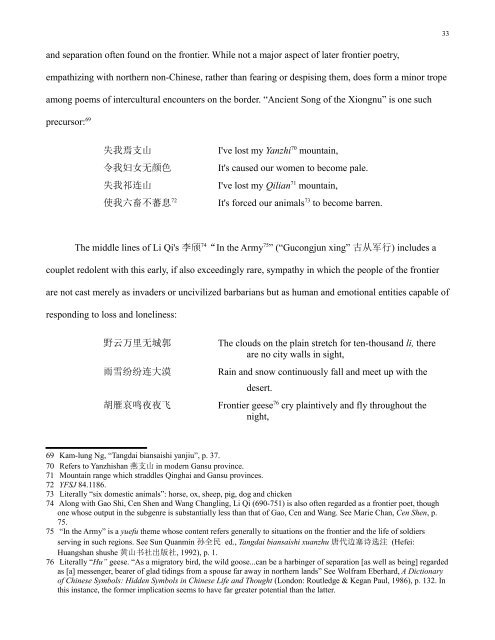View/Open - University of Victoria
View/Open - University of Victoria
View/Open - University of Victoria
You also want an ePaper? Increase the reach of your titles
YUMPU automatically turns print PDFs into web optimized ePapers that Google loves.
33<br />
and separation <strong>of</strong>ten found on the frontier. While not a major aspect <strong>of</strong> later frontier poetry,<br />
empathizing with northern non-Chinese, rather than fearing or despising them, does form a minor trope<br />
among poems <strong>of</strong> intercultural encounters on the border. “Ancient Song <strong>of</strong> the Xiongnu” is one such<br />
precursor: 69<br />
失 我 焉 支 山<br />
令 我 妇 女 无 颜 色<br />
失 我 祁 连 山<br />
72<br />
使 我 六 畜 不 蕃 息<br />
I've lost my Yanzhi 70 mountain,<br />
It's caused our women to become pale.<br />
I've lost my Qilian 71 mountain,<br />
It's forced our animals 73 to become barren.<br />
74<br />
The middle lines <strong>of</strong> Li Qi's 李 颀 “In the Army 75 ” (“Gucongjun xing” 古 从 军 行 ) includes a<br />
couplet redolent with this early, if also exceedingly rare, sympathy in which the people <strong>of</strong> the frontier<br />
are not cast merely as invaders or uncivilized barbarians but as human and emotional entities capable <strong>of</strong><br />
responding to loss and loneliness:<br />
野 云 万 里 无 城 郭<br />
雨 雪 纷 纷 连 大 漠<br />
胡 雁 哀 鸣 夜 夜 飞<br />
The clouds on the plain stretch for ten-thousand li, there<br />
are no city walls in sight,<br />
Rain and snow continuously fall and meet up with the<br />
desert.<br />
Frontier geese 76 cry plaintively and fly throughout the<br />
night,<br />
69 Kam-lung Ng, “Tangdai biansaishi yanjiu”, p. 37.<br />
70 Refers to Yanzhishan 燕 支 山 in modern Gansu province.<br />
71 Mountain range which straddles Qinghai and Gansu provinces.<br />
72 YFSJ 84.1186.<br />
73 Literally “six domestic animals”: horse, ox, sheep, pig, dog and chicken<br />
74 Along with Gao Shi, Cen Shen and Wang Changling, Li Qi (690-751) is also <strong>of</strong>ten regarded as a frontier poet, though<br />
one whose output in the subgenre is substantially less than that <strong>of</strong> Gao, Cen and Wang. See Marie Chan, Cen Shen, p.<br />
75.<br />
75 “In the Army” is a yuefu theme whose content refers generally to situations on the frontier and the life <strong>of</strong> soldiers<br />
serving in such regions. See Sun Quanmin 孙 全 民 ed., Tangdai biansaishi xuanzhu 唐 代 边 塞 诗 选 注 (Hefei:<br />
Huangshan shushe 黄 山 书 社 出 版 社 , 1992), p. 1.<br />
76 Literally “Hu” geese. “As a migratory bird, the wild goose...can be a harbinger <strong>of</strong> separation [as well as being] regarded<br />
as [a] messenger, bearer <strong>of</strong> glad tidings from a spouse far away in northern lands” See Wolfram Eberhard, A Dictionary<br />
<strong>of</strong> Chinese Symbols: Hidden Symbols in Chinese Life and Thought (London: Routledge & Kegan Paul, 1986), p. 132. In<br />
this instance, the former implication seems to have far greater potential than the latter.
















